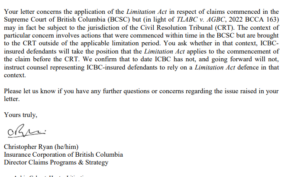Precedent – Previous Crash Damage Not a Barrier To ICBC “Accelerated Depreciation” Claim
BC’s monopoly auto insurer, ICBC, loves to deny accelerated depreciation claims (“AD”).
In short when a vehicle is damaged in a crash it often suffers a loss of market value, even after all reasonable repairs are done. This is called AD. ICBC routinely chooses to ignore this reality when dealing with crash victims and raises invalid arguments trying to deny such claims. One of their favourite talking points is saying if a vehicle had a previous crash it could not possibly suffer a further AD. This week the BC Civil Resolution Tribunal released reasons for judgement soundly rejecting this argument.
In the recent case (Yeung v. Izadi, 2022 BCCRT 1060) the Plaintiff owned a Tesla which was involved in a crash caused by the Defendant (and insured by ICBC). The crash resulted in over $20,000 in repairs. After repair the Plaintiff obtained appraisal evidence that the vehicle now had thousands of dollars in diminished AD value. ICBC refused to pay arguing that the vehicle, which was involved in 2 previous collisions themselves resulting in thousands of dollars of repairs, could not possibly sustain further AD.
The Plaintiff sued and succeeded in having damages for AD awarded. In doing so BC’s Civil Resolution Tribunal found there is no reason why an already depreciated asset from damage cannot be further depreciated by further damage. In awarding damages for the claim Tribunal Member Nav Shukla provided the following sensible reasons:
It is undisputed that the Tesla’s repairs before the accident did not involve structural damage. Both experts agreed that the accident caused structural damage and that structural repairs impact a vehicle’s depreciation. However, although Keith Jones said that structural damage was a factor to consider in determining accelerated depreciation, they did not explain why the change in the Tesla being previously free of structural repairs and now having had structural repairs did not result in some accelerated depreciation. As noted above, Mr. Scarrow specifically discussed the structural damage in their report and noted that the repairs eliminated the Tesla’s previous state of being free of structural repairs.
On balance I find Mr. Scarrow’s report better explained the importance of the factors they relied on to determine the Tesla’s pre and post accident values and so I give their report more weight. Based on Mr. Scarrow’s evidence I find the Applicant has proven that the Accident has caused accelerated depreciation to the Tesla.
Now the postscript – BC’s new No Fault system has taken away the rights of crash victims to claim for accelerated depreciation. But crash victims with ongoing claims that pre-date the No Fault laws (or ‘enhanced care’ as ICBC’s multi million dollar marketing campaign calls it) can still benefit from this precedent.
